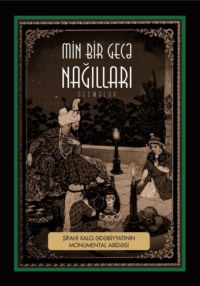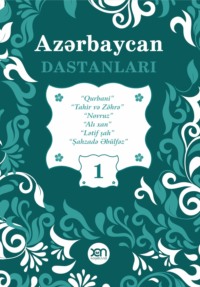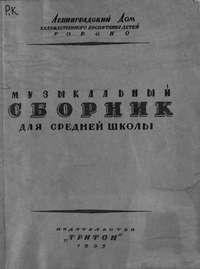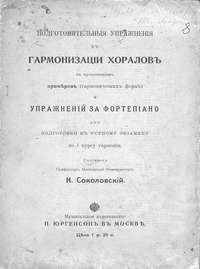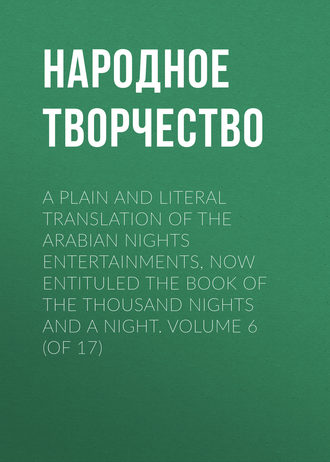 полная версия
полная версияA plain and literal translation of the Arabian nights entertainments, now entituled The Book of the Thousand Nights and a Night. Volume 6 (of 17)
THE CITY OF BRASS. 104
It is related that there was, in tide of yore and in times and years long gone before, at Damascus of Syria, a Caliph known as Abd al-Malik bin Marwan, the fifth of the Ommiade house. As this Commander of the Faithful was seated one day in his palace, conversing with his Sultans and Kings and the Grandees of his empire, the talk turned upon the legends of past peoples and the traditions of our Lord Solomon, David’s son (on the twain be peace!), and on that which Allah Almighty had bestowed on him of lordship and dominion over men and Jinn and birds and beasts and reptiles and the wind and other created things; and quoth the Caliph, “Of a truth we hear from those who forewent us that the Lord (extolled and exalted be He!) vouchsafed unto none the like of that which He vouchsafed unto our lord Solomon and that he attained unto that whereto never attained other than he, in that he was wont to imprison Jinns and Marids and Satans in cucurbites of copper and to stop them with lead and seal105 them with his ring.”–And Shahrazad perceived the dawn of day and ceased saying her permitted say.
Now when it was the Five Hundred and Sixty-seventh Night,She said, It hath reached me, O auspicious King, that when the Caliph Abd al-Malik bin Marwan sat conversing with his Grandees concerning our lord Solomon, and these noted what Allah had bestowed upon him of lordship and dominion, quoth the Commander of the Faithful, “Indeed he attained unto that whereto never attained other than he, in that he was wont to imprison Jinns and Marids and Satans in cucurbites of copper and stop them with lead and seal them with his ring.” Then said Tálib bin Sahl (who was a seeker after treasures and had books that discovered to him hoards and wealth hidden under the earth), “O Commander of the Faithful,—Allah make thy dominion to endure and exalt thy dignity here and hereafter!—my father told me of my grandfather, that he once took ship with a company, intending for the island of Sikiliyah or Sicily, and sailed until there arose against them a contrary wind, which drove them from their course and brought them, after a month, to a great mountain in one of the lands of Allah the Most High, but where that land was they wot not.” Quoth my grandfather:—This was in the darkness of the night and as soon as it was day, there came forth to us, from the caves of the mountain, folk black of colour and naked of body, as they were wild beasts, understanding not one word of what was addressed to them; nor was there any of them who knew Arabic, save their King who was of their own kind. When he saw the ship, he came down to it with a company of his followers and saluting us, bade us welcome and questioned us of our case and our faith. We told him all concerning ourselves and he said, Be of good cheer for no harm shall befal you. And when we, in turn, asked them of their faith, we found that each was of one of the many creeds prevailing before the preaching of Al-Islam and the mission of Mohammed, whom may Allah bless and keep! So my shipmates remarked, We wot not what thou sayest. Then quoth the King, No Adam-son hath ever come to our land before you: but fear not, and rejoice in the assurance of safety and of return to your own country. Then he entertained us three days, feeding us on the flesh of birds and wild beasts and fishes, than which they had no other meat; and, on the fourth day, he carried us down to the beach, that we might divert ourselves by looking upon the fisher-folk. There we saw a man casting his net to catch fish, and presently he pulled them up and behold, in them was a cucurbite of copper, stopped with lead and sealed with the signet of Solomon, son of David, on whom be peace! He brought the vessel to land and broke it open, when there came forth a smoke, which rose a-twisting blue to the zenith, and we heard a horrible voice, saying, I repent! I repent! Pardon, O Prophet of Allah! I will never return to that which I did aforetime. Then the smoke became a terrible Giant frightful of form, whose head was level with the mountain-tops, and he vanished from our sight, whilst our hearts were well-nigh torn out for terror; but the blacks thought nothing of it. Then we returned to the King and questioned him of the matter; whereupon quoth he, Know that this was one of the Jinns whom Solomon, son of David, being wroth with them, shut up in these vessels and cast into the sea, after stopping the mouths with melted lead. Our fishermen ofttimes, in casting their nets, bring up such bottles, which being broken open, there come forth of them Jinnis who, deeming that Solomon is still alive and can pardon them, make their submission to him and say, “I repent, O Prophet of Allah!” The Caliph marvelled at Talib’s story and said, “Glory be to God! Verily, to Solomon was given a mighty dominion.” Now Al-Nábighah al-Zubyání106 was present, and he said, “Talib hath spoken soothly as is proven by the saying of the All-wise, the Primæval One:—
And Solomon, when Allah to him said,‘Rise, be thou Caliph, rule with righteous sway:Honour obedience for obeying thee;And who rebels imprison him for aye.’Wherefore he used to put them in copper-bottles and cast them into the sea.” The poet’s words seemed good to the Caliph, and he said, “By Allah, I long to look upon some of these Solomonic vessels, which must be a warning to whoso will be warned.” “O Commander of the Faithful,” replied Talib, “it is in thy power to do so, without stirring abroad. Send to thy brother Abd al-Azíz bin Marwán, so he may write to Músá bin Nusayr,107 governor of the Maghrib or Morocco, bidding him take horse thence to the mountains whereof I spoke and fetch thee therefrom as many of such cucurbites as thou hast a mind to; for those mountains adjoin the frontiers of his province.” The Caliph approved his counsel and said “Thou hast spoken sooth, O Talib, and I desire that, touching this matter, thou be my messenger to Musa bin Nusayr; wherefore thou shalt have the White Flag108 and all thou hast a mind to of monies and honour and so forth; and I will care for thy family during thine absence.” “With love and gladness, O Commander of the Faithful!” answered Talib. “Go, with the blessing of Allah and His aid,” quoth the Caliph, and bade write a letter to his brother, Abd al-Aziz, his viceroy in Egypt, and another to Musa bin Nusayr, his viceroy in North-Western Africa, bidding him go himself in quest of the Solomonic bottles, leaving his son to govern in his stead. Moreover, he charged him to engage guides and to spare neither men nor money, nor to be remiss in the matter as he would take no excuse. Then he sealed the two letters and committed them to Talib bin Sahl, bidding him advance the royal ensigns before him and make his utmost speed, and he gave him treasure and horsemen and footmen, to further him on his way, and made provision for the wants of his household during his absence. So Talib set out and arrived in due course at Cairo.109——And Shahrazad perceived the dawn of day and ceased to say her permitted say.
Now when it was the Five Hundred and Sixty-eighth Night,She said, It hath reached me, O auspicious King, that Talib bin Sahl set out with his escort and crossed the desert country between Syria and Egypt, where the Governor came out to meet him and entreated him and his company with high honour whilst they tarried with him. Then he gave them a guide to bring them to the Sa’íd or Upper Egypt, where the Emir Musa had his abiding-place; and when the son of Nusayr heard of Talib’s coming, he went forth to meet him and rejoiced in him. Talib gave him the Caliph’s letter, and he took it reverently and, laying it on his head, cried, “I hear and I obey the Prince of the Faithful.” Then he deemed it best to assemble his chief officers and when all were present he acquainted them with the contents of the Caliph’s letter and sought counsel of them how he should act. “O Emir,” answered they, “if thou seek one who shall guide thee to the place summon the Shaykh ‘Abd al-Samad, ibn ‘Abd al-Kuddús, al-Samúdí;110 for he is a man of varied knowledge, who hath travelled much and knoweth by experience all the seas and wastes and wolds and countries of the world and the inhabitants and wonders thereof; wherefore send thou for him and he will surely guide thee to thy desire.” So Musa sent for him, and behold, he was a very ancient man shot in years and broken down with lapse of days. The Emir saluted him and said, “O Shaykh Abd al-Samad, our lord the Commander of the Faithful, Abd al-Malik bin Marwan, hath commanded me thus and thus. I have small knowledge of the land wherein is that which the Caliph desireth; but it is told me that thou knowest it well and the ways thither. Wilt thou, therefore, go with me and help me to accomplish the Caliph’s need? So it please Allah the Most High, thy trouble and travail shall not go waste.” Replied the Shaykh, “I hear and obey the bidding of the Commander of the Faithful; but know, O Emir, that the road thither is long and difficult and the ways few.” “How far is it?” asked Musa, and the Shaykh answered, “It is a journey of two years and some months going and the like returning; and the way is full of hardships and terrors and things wondrous and marvellous. Now thou art a champion of the Faith111 and our country is hard by that of the enemy; and peradventure the Nazarenes may come out upon us in thine absence; wherefore it behoveth thee to leave one to rule thy government in thy stead.” “It is well,” answered the Emir and appointed his son Hárún Governor during his absence, requiring the troops to take the oath of fealty to him and bidding them obey him in all he should command. And they heard his words and promised obedience. Now this Harun was a man of great prowess and a renowned warrior and a doughty knight, and the Shaykh Abd al-Samad feigned to him that the place they sought was distant but four months’ journey along the shore of the sea, with camping-places all the way, adjoining one another, and grass and springs, adding, “Allah will assuredly make the matter easy to us through thy blessing, O Lieutenant of the Commander of the Faithful!” Quoth the Emir Musa, “Knowest thou if any of the Kings have trodden this land before us?”; and quoth the Shaykh, “Yes, it belonged aforetime to Darius the Greek, King of Alexandria.” But he said to Musa privily, “O Emir, take with thee a thousand camels laden with victual and store of gugglets.”112 The Emir asked, “And what shall we do with these?”; and the Shaykh answered, “On our way is the desert of Kayrawán or Cyrene, the which is a vast wold four days’ journey long, and lacketh water; nor therein doth sound of voice ever sound nor is soul at any time to be seen. Moreover, there bloweth the Simoon113 and other hot winds called Al-Juwayb, which dry up the water-skins; but if the water be in gugglets, no harm can come to it.” “Right,” said Musa and sending to Alexandria, let bring thence great plenty of gugglets. Then he took with him his Wazir and two thousand cavalry, clad in mail cap-à-pie and set out, without other to guide them but Abd al-Samad who forewent them, riding on his hackney. The party fared on diligently, now passing through inhabited lands, then ruins and anon traversing frightful wolds and thirsty wastes and then mountains which spired high in air; nor did they leave journeying a whole year’s space till, one morning, when the day broke, after they had travelled all night, behold, the Shaykh found himself in a land he knew not and said, “There is no Majesty and there is no Might save in Allah, the Glorious, the Great!” Quoth the Emir, “What is to do, O Shaykh?”; and he answered, saying, “By the Lord of the Ka’abah, we have wandered from our road!” “How cometh that?” asked Musa, and Abd al-Samad replied, “The stars were overclouded and I could not guide myself by them.” “Where on God’s earth are we now?” asked the Emir, and the Shaykh answered, “I know not; for I never set eyes on this land till this moment.” Said Musa, “Guide us back to the place where we went astray”; but the other, “I know it no more.” Then Musa, “Let us push on; haply Allah will guide us to it or direct us aright of His power.” So they fared on till the hour of noon-prayer, when they came to a fair champaign, and wide and level and smooth as it were the sea when calm, and presently there appeared to them, on the horizon some great thing, high and black, in whose midst was as it were smoke rising to the confines of the sky. They made for this, and stayed not in their course till they drew near thereto, when, lo! it was a high castle, firm of foundations and great and gruesome, as it were a towering mountain, builded all of black stone, with frowning crenelles and a door of gleaming China steel, that dazzled the eyes and dazed the wits. Round about it were a thousand steps and that which appeared afar off as it were smoke was a central dome of lead an hundred cubits high. When the Emir saw this, he marvelled thereat with exceeding marvel and how this place was void of inhabitants; and the Shaykh, after he had certified himself thereof, said, “There is no god but the God and Mohammed is the Apostle of God!” Quoth Musa, “I hear thee praise the Lord and hallow Him, and meseemeth thou rejoicest.” “O Emir,” answered Abd al-Samad, “Rejoice, for Allah (extolled and exalted be He!) hath delivered us from the frightful wolds and thirsty wastes.” “How knowest thou that?” said Musa, and the other, “I know it for that my father told me of my grandfather that he said:—We were once journeying in this land and, straying from the road, we came to this palace and thence to the City of Brass; between which and the place thou seekest is two full months’ travel; but thou must take to the sea-shore and leave it not, for there be watering-places and wells and camping-grounds established by King Zú al-Karnayn Iskandar who, when he went to the conquest of Mauritania, found by the way thirsty deserts and wastes and wilds and dug therein water-pits and built cisterns.” Quoth Musa, “Allah rejoice thee with good news!” and quoth the Shaykh, “Come, let us go look upon yonder palace and its marvels, for it is an admonition to whoso will be admonished.” So the Emir went up to the palace, with the Shaykh and his officers, and coming to the gate, found it open. Now this gate was builded with lofty columns and porticoes whose walls and ceilings were inlaid with gold and silver and precious stones; and there led up to it flights of steps, among which were two wide stairs of coloured marble, never was seen their like; and over the doorway was a tablet whereon were graven letters of gold in the old ancient Ionian character. “O Emir,” asked the Shaykh, “shall I read?”; and Musa answered, “Read and God bless thee!; for all that betideth us in this journey dependeth upon thy blessing.” So the Shaykh, who was a very learned man and versed in all tongues and characters, went up to the tablet and read whatso was thereon and it was verse like this:—
The signs that here their mighty works portrayWarn us that all must tread the self-same way:O thou who standest in this stead to hearTidings of folk, whose power hath passed for aye,Enter this palace-gate and ask the newsOf greatness fallen into dust and clay:Death has destroyed them and dispersed their mightAnd in the dust they lost their rich display;As had they only set their burdens downTo rest awhile, and then had rode away.When the Emir Musa heard these couplets, he wept till he lost his senses and said, “There is no god but the God, the Living, the Eternal, who ceaseth not!” Then he entered the palace and was confounded at its beauty and the goodliness of its construction. He diverted himself awhile by viewing the pictures and images therein, till he came to another door, over which also were written verses, and said to the Shaykh, “Come read me these!” So he advanced and read as follows:—
Under these domes how many a companyHalted of old and fared withouten stay:See thou what might displays on other wightsTime with his shifts which could such lords waylay:They shared together what they gatherèdAnd left their joys and fared to Death-decay:What joys they joyed! what food they ate! and nowIn dust they’re eaten, for the worm a prey.At this the Emir Musa wept bitter tears; and the world waxed yellow before his eyes and he said, “Verily, we were created for a mighty matter!”114 Then they proceeded to explore the palace and found it desert and void of living thing, its courts desolate and dwelling-places waste laid. In the midst stood a lofty pavilion with a dome rising high in air, and about it were four hundred tombs, builded of yellow marble. The Emir drew near unto these and behold, amongst them was a great tomb, wide and long; and at its head stood a tablet of white marble, whereon were graven these couplets:—
How oft have I fought! and how many have slain!How much have I witnessed of blessing and bane!How much have I eaten! how much have I drunk!How oft have I hearkened to singing-girl’s strain!How much have I bidden! how oft have forbid!How many a castle and castellainI have sieged and have searched, and the cloistered maidsIn the depths of its walls for my captives were ta’en!But of ignorance sinned I to win me the meedsWhich won provèd naught and brought nothing of gain:Then reckon thy reck’ning, O man, and be wiseEre the goblet of death and of doom thou shalt drain;For yet but a little the dust on thy headThey shall strew, and thy life shall go down to the dead.The Emir and his companions wept; then, drawing near unto the pavilion, they saw that it had eight doors of sandal-wood, studded with nails of gold and stars of silver and inlaid with all manner precious stones. On the first door were written these verses:—
What I left, I left it not for nobility of soul,But through sentence and decree that to every man are dight.What while I lived happy, with a temper haught and high,My hoarding-place defending like a lion in the fight,I took no rest, and greed of gain forbad me give a grainOf mustard-seed to save from the fires of Hell my sprite,Until stricken on a day, as with arrow, by decreeOf the Maker, the Fashioner, the Lord of Might and Right.When my death was appointed, my life I could not keepBy the many of my stratagems, my cunning and my sleight:My troops I had collected availed me not, and noneOf my friends and of my neighbours had power to mend my plight:Through my life I was wearied in journeying to deathIn stress or in solace, in joyance or despight:So when money-bags are bloated, and dinar unto dinarThou addest, all may leave thee with fleeting of the night:And the driver of a camel and the digger of a grave115Are what thine heirs shall bring ere the morning dawneth bright:And on Judgment Day alone shalt thou stand before thy Lord,Overladen with thy sins and thy crimes and thine affright:Let the world not seduce thee with lurings, but beholdWhat measure to thy family and neighbours it hath doled.When Musa heard these verses, he wept with such weeping that he swooned away; then, coming to himself, he entered the pavilion and saw therein a long tomb, awesome to look upon, whereon was a tablet of China steel and Shaykh Abd al-Samad drew near it and read this inscription: “In the name of Everlasting Allah, the Never-beginning, the Never-ending; in the name of Allah who begetteth not nor is He begot and unto whom the like is not; in the name of Allah the Lord of Majesty and Might; in the name of the Living One who to death is never dight!”–And Shahrazad perceived the dawn of day and ceased saying her permitted say.
Now when it was the Five Hundred and Sixty-ninth Night,She said, It hath reached me, O auspicious King, that Shaykh Abd al-Samad, having read the aforesaid, also found the following:—O thou who comest to this place, take warning by that which thou seest of the accidents of Time and the vicissitudes of Fortune and be not deluded by the world and its pomps and vanities and fallacies and falsehoods and vain allurements, for that it is flattering, deceitful and treacherous, and the things thereof are but a loan to us which it will borrow back from all borrowers. It is like unto the dreams of the dreamer and the sleep-visions of the sleeper or as the mirage of the desert, which the thirsty take for water;116 and Satan maketh it fair for men even unto death. These are the ways of the world; wherefore put not thou thy trust therein neither incline thereto, for it bewrayeth him who leaneth upon it and who committeth himself thereunto in his affairs. Fall not thou into its snares neither take hold upon its skirts, but be warned by my example. I possessed four thousand bay horses and a haughty palace, and I had to wife a thousand daughters of kings, high-bosomed maids, as they were moons: I was blessed with a thousand sons as they were fierce lions, and I abode a thousand years, glad of heart and mind, and I amassed treasures beyond the competence of all the Kings of the regions of the earth, deeming that delight would still endure to me. But there fell on me unawares the Destroyer of delights and the Sunderer of societies, the Desolator of domiciles and the Spoiler of inhabited spots, the Murtherer of great and small, babes and children and mothers, he who hath no ruth on the poor for his poverty, or feareth the King for all his bidding or forbidding. Verily, we abode safe and secure in this palace, till there descended upon us the judgement of the Lord of the Three Worlds, Lord of the Heavens, and Lord of the Earths, the vengeance of the Manifest Truth117 overtook us, when there died of us every day two, till a great company of us had perished. When I saw that destruction had entered our dwellings and had homed with us and in the sea of deaths had drowned us, I summoned a writer and bade him indite these verses and instances and admonitions, the which I let grave, with rule and compass, on these doors and tablets and tombs. Now I had an army of a thousand thousand bridles, men of warrior mien with forearms strong and keen, armed with spears and mail-coats sheen and swords that gleam; so I bade them don their long-hanging hauberks and gird on their biting blades and mount their high-mettled steeds and level their dreadful lances; and whenas there fell on us the doom of the Lord of heaven and earth, I said to them, “Ho, all ye soldiers and troopers, can ye avail to ward off that which is fallen on me from the Omnipotent King?” But troopers and soldiers availed not unto this and said, “How shall we battle with Him to whom no chamberlain barreth access, the Lord of the door which hath no doorkeeper?” Then quoth I to them, “Bring me my treasures.” Now I had in my treasuries a thousand cisterns in each of which were a thousand quintals118 of red gold and the like of white silver, besides pearls and jewels of all kinds and other things of price, beyond the attainment of the kings of the earth. So they did that and when they had laid all the treasure in my presence, I said to them, “Can ye ransom me with all this treasure or buy me one day of life therewith?” But they could not! So they resigned themselves to fore-ordained Fate and fortune and I submitted to the judgement of Allah, enduring patiently that which he decreed unto me of affliction, till He took my soul and made me to dwell in my grave. And if thou ask of my name, I am Kúsh, the son of Shaddád son of Ád the Greater. And upon the tablets were engraved these lines:—
An thou wouldst know my name, whose day is doneWith shifts of time and changes ‘neath the sun,Know I am Shaddád’s son, who ruled mankindAnd o’er all earth upheld dominion!All stubborn peoples abject were to me;And Shám to Cairo and to Adnanwone;119I reigned in glory conquering many kings;And peoples feared my mischief every one.Yea, tribes and armies in my hand I saw;The world all dreaded me, both friends and fone.When I took horse, I viewed my numbered troops,Bridles on neighing steeds a million.And I had wealth that none could tell or count,Against misfortune treasuring all I won;Fain had I bought my life with all my wealth,And for a moment’s space my death to shun;But God would naught save what His purpose willed;So from my brethren cut I ‘bode alone:And Death, that sunders man, exchanged my lotTo pauper hut from grandeur’s mansion,When found I all mine actions gone and pastWherefor I’m pledged120 and by my sin undone.Then fear, O man, who by a brink dost range,The turns of Fortune and the chance of Change.The Emir Musa was hurt to his heart and loathed his life for what he saw of the slaughtering-places of the folk; and, as they went about the highways and bye-ways of the palace, viewing its sitting-chambers and pleasaunces, behold they came upon a table of yellow onyx, upborne on four feet of juniper-wood,121 and thereon these words graven:—“At this table have eaten a thousand kings blind of the right eye and a thousand blind of the left and yet other thousand sound of both eyes, all of whom have departed the world and have taken up their sojourn in the tombs and the catacombs.” All this the Emir wrote down and left the palace, carrying off with him naught save the table aforesaid. Then he fared on with his host three days’ space, under the guidance of the Shaykh Abd al-Samad, till they came to a high hill, whereon stood a horseman of brass. In his hand he held a lance with a broad head, in brightness like blinding leven, whereon was graven:—“O thou that comest unto me, if thou know not the way to the City of Brass, rub the hand of this rider and he will turn round and presently stop. Then take the direction whereto he faceth and fare fearless, for it will bring thee, without hardship, to the city aforesaid.”–And Shahrazad perceived the dawn of day and ceased to say her permitted say.


